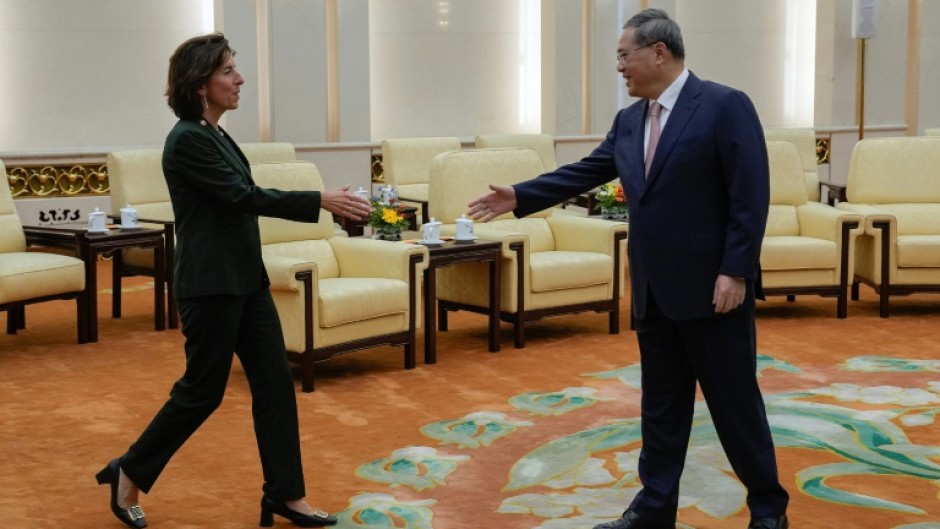BEIJING - China's premier warned US officials Tuesday that moves to "politicise" trade issues would prove "disastrous" for the global economy, state media reported.
US Commerce Secretary Gina Raimondo is currently on a four-day bridge-building visit to China aimed at better managing tensions between the world's two largest economies.
But a meeting with Premier Li Qiang Tuesday saw the top official lay into American trade curbs against Beijing, which Washington insists are necessary for its national security but which China says are meant to clip its economic rise.
"Politicizing economic and trade issues and overstretching the concept of security will... seriously affect bilateral relations and mutual trust," he told Raimondo, according to China's official Xinhua news agency.
They "also undermine the interests of enterprises and people of the two countries, and will have a disastrous impact on the global economy", he added.
Relations between the two countries have plummeted to some of their lowest levels in decades, with US trade curbs near the top of the list of disagreements.
This month, Biden issued an executive order aimed at restricting certain US investments in sensitive high-tech areas in China -- a move Beijing blasted as being "anti-globalisation".
The long-anticipated rules, expected to be implemented next year, target sectors such as semiconductors and artificial intelligence.
Premier Li on Tuesday urged the US to change tack, saying "the two sides should strengthen mutually beneficial cooperation, reduce friction and confrontation, and jointly promote world economic recovery and cope with global challenges".
While Li used their meeting to condemn US policy, Raimondo stressed the importance of open communication between the two powers.
Pointing to areas of "global concern" like climate change, Artificial Intelligence and fentanyl addiction, she told Li that Washington wants to "work with you as two global powers to do what is right for all of humanity".
"The world is expecting us to step up together to solve these problems," she said.
Raimondo also reiterated the US position that it is not seeking to decouple its economy from China's.
"We seek to maintain our $700 billion commercial relationship with China, and we hope that that relationship can provide stability for the overall relationship," she said.
Earlier on Tuesday, Raimondo met China's vice premier, He Lifeng, describing the US-China commercial relationship as "one of the most consequential" in the world.
"Managing that relationship responsibly is critical to both of our nations and indeed to the whole world," she said during a part of the meeting open to journalists.
She stressed the US would "never compromise in protecting our national security", but added that Washington did not seek "to hold China's economy back".
Raimondo heads to China's economic powerhouse Shanghai later on Tuesday and will leave the country on Wednesday.
- 'Reduce misunderstanding' -
The commerce secretary is one of a number of senior US officials to visit China in recent months -- part of an effort by Washington to improve its working relationship with its largest strategic rival.
She has used the trip to seek more open discussions with the Chinese over restrictive trade curbs.
On Monday she met with Commerce Minister Wang Wentao, with the two sides agreeing to set up a working group to iron out the laundry list of trade disputes between them.
They also agreed to set up what Washington called an "export control enforcement information exchange" -- described as a platform to "reduce misunderstanding of US national security policies".
Beijing has throughout the trip painted a less rosy picture than the United States, saying Wang had raised "serious concerns" over Washington's trade curbs.
Those included "US Section 301 tariffs on Chinese goods, its semiconductor policies, restrictions of two-way investment, discriminatory subsidies, and sanctions on Chinese enterprises", Beijing's commerce ministry said.
Washington defends the policies as necessary to "de-risk" its supply chains.
But Wang warned they "run counter to market rules and the principle of fair competition, and will only harm the security and stability of the global industrial and supply chains".

